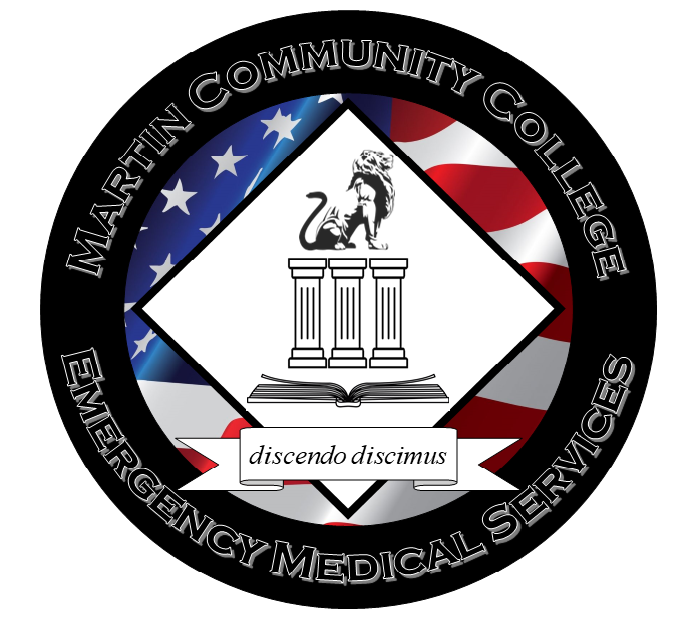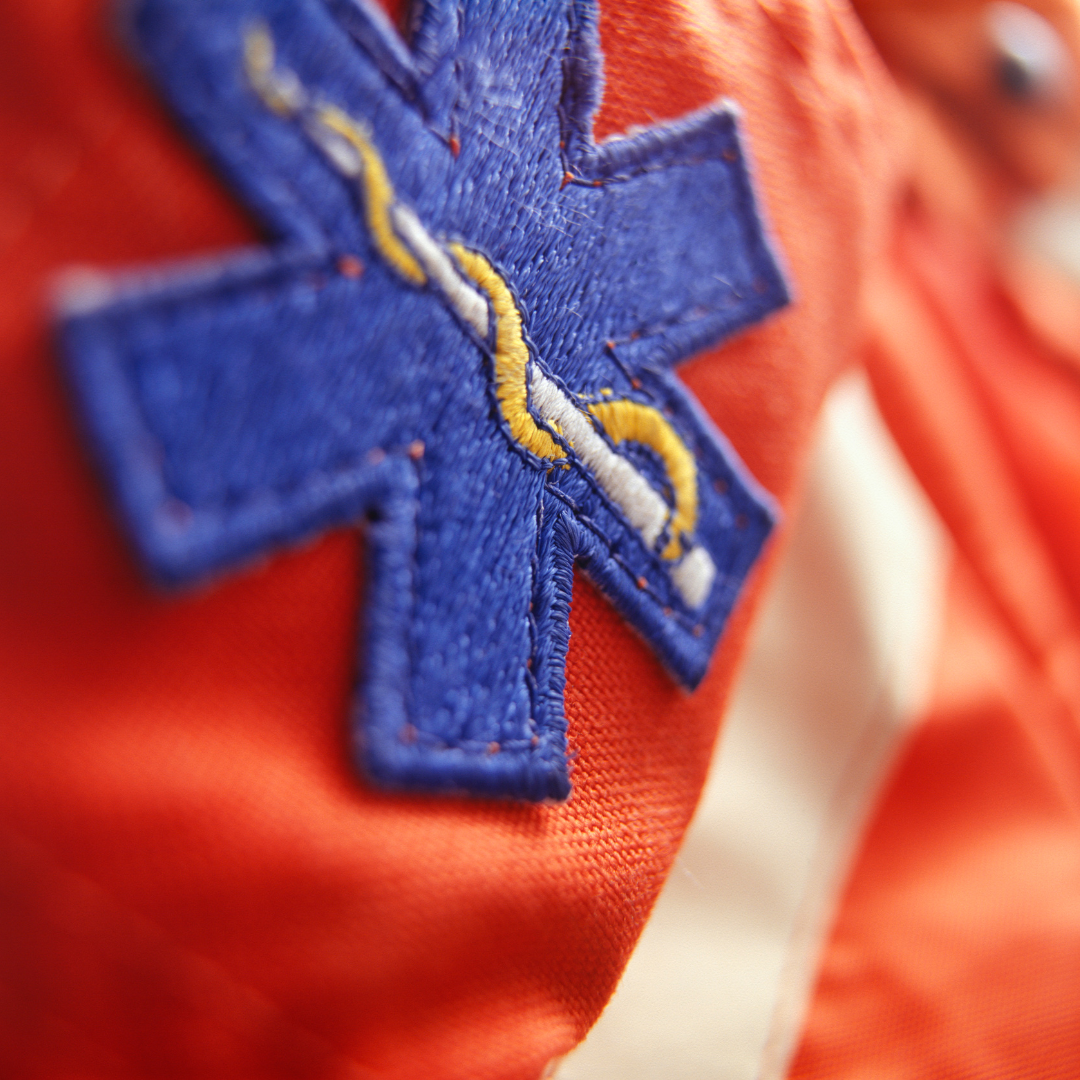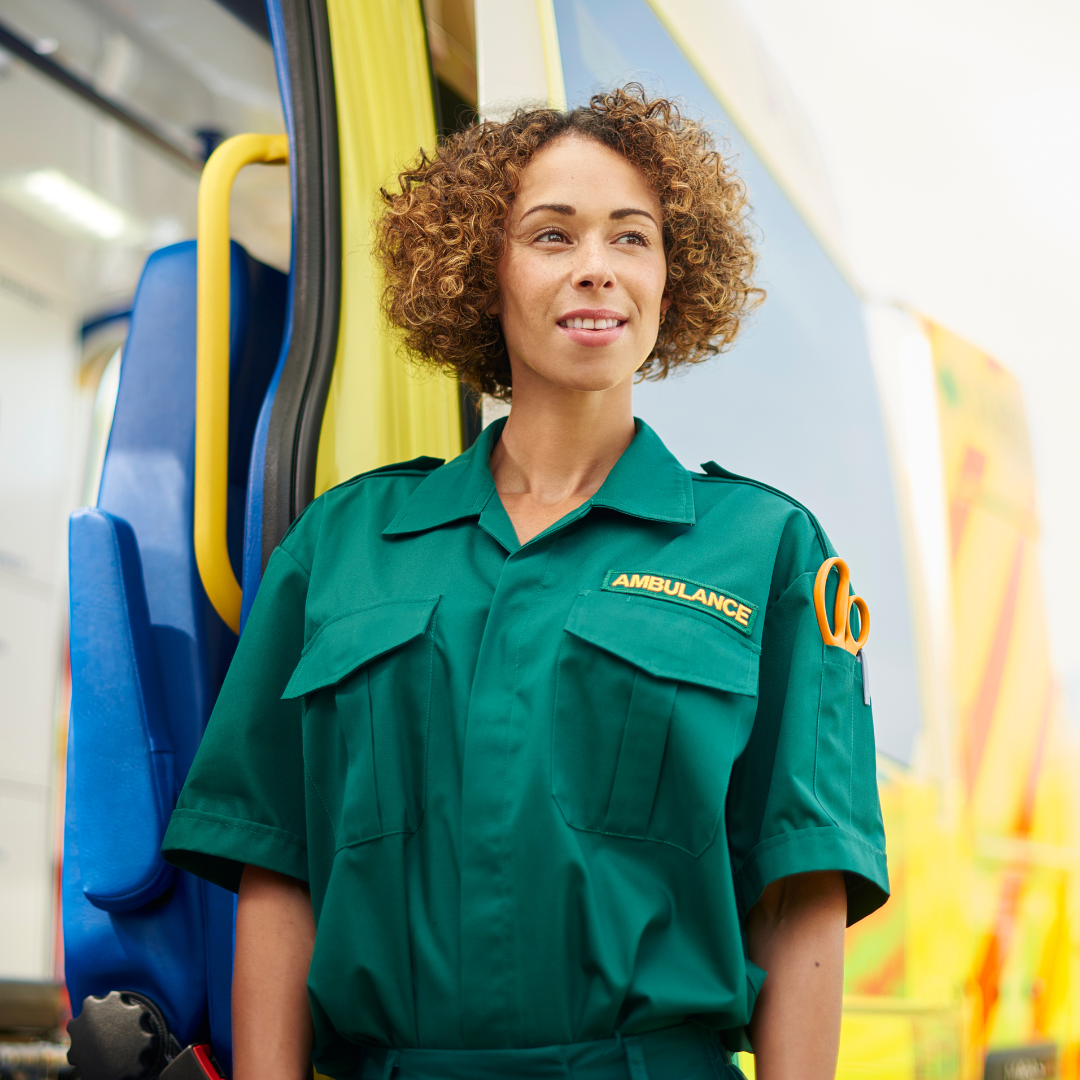
Martin Community College offers world-class training for current and prospective emergency-medical professionals. Courses are designed to meet the needs of local emergency-services agencies, healthcare providers, and the public -- with an emphasis on emergency patient care in pre-hospital and nontraditional settings.
Program Goal: To prepare competent entry-level Paramedics in the cognitive (knowledge), psychomotor (skills), and affective (behavior) learning domains with or without exit points at the Advanced Emergency Medical Technician and/or Emergency Medical Technician, and/or Emergency Medical Responder levels.
American Heart Association Courses
Martin Community College offers Basic Life Support, Heartsaver series, Advanced Cardiac Life Support, and Pediatric Advanced Life Support courses. Certification card prices are listed below.
| Basic Life Support (BLS) | Heartsaver (CPR/AED/First Aid) | Advanced Cardiovascular Life Support (ACLS) | Pediatric Advanced Life Support (PALS) | Heartsaver (K-12) |
|---|---|---|---|---|
| $11.00 | $26.00 | $13.00 | $13.00 | $11.00 |
***Card prices are controlled by the American Heart Association and are subject to change.
- Course tuition is $70.00.
- Certification cards are required.
- To register, click "Schedule & Registration" link below.
To determine which course is right for you, visit the American Heart Association
American Heart Association Instructor Courses
Martin Community College offers instructor courses in Basic Life Support (BLS), Heartsaver series, Advanced Cardiac Life Support (ACLS), and Pediatric Advanced Life Support (PALS).
Steps to become an American Heart Association Instructor are listed below.
- Become affiliated with a Training Center. Visit the AHA Instructor Network to locate a Training Center near you.
- Purchase instructor materials for the desired discipline prior to the start date of the class. You may purchase the materials at AHA Shop CPR.
- Register for and successfully complete the discipline-specific online Instructor Essentials course.
| BLS* | Heartsaver* | ACLS | PALS |
|---|---|---|---|
| $38.00 | $35.00 | $38.00 | $38.00 |
| Essentials Course Link | Essentials Course Link | Essentials Course Link | Essentials Course Link |
- Be successfully monitored while teaching your first course within 6 (six) months of completing the classroom Instructor Course. Your Training Center may require additional additional monitoring.
*BLS Instructor candidates must take both BLS and Heartsaver Essentials Courses.
**Essentials Course prices are paid to the American Heart Association and are subject to change.
- Course tuition is $70.00.
- To register, click "Schedule & Registration" link below.
To determine which course is right for you, visit the American Heart Association
Emergency Medical Responder (formerly First Responder)

The Emergency Medical Responder Program at Martin Community College may consist of any combination of didactic, lab, online, and clinical education at or above the minimum of 96 hours as set forth by the North Carolina Office of EMS. MCC’s EMT Program is provided through the Continuing Education Department.
Current Program Requirement: 148.0 hours
Cadet Eligibility
Those seeking to be EMR Cadets must meet the following requirements:
- Be at least 18 years of age by program end date
- Present a resume or curriculm vitae showing a minimum of six (6) months work or volunteer experience
- Hold a current and valid Class C driver's license
Emergency Medical Technician (formerly EMT Basic)

The EMT Program at Martin Community College may consist of any combination of didactic, lab, online, and clinical education at or above the minimum of 240 hours as set forth by the North Carolina Office of EMS. MCC’s EMT Program is provided through the Continuing Education Department with the program being qualified for up to 6 transfer credits at participating institutions.
Current Program Requirement: 260.0 hours
Cadet Eligibility
Those seeking to be EMT Cadets must meet the following requirements:
- Be at least 18 years of age by program end date
- Present a resume or curriculum vitae showing a minimum of six (6) months work or volunteer experience
- Hold a current and valid Class C driver's license

Advanced Emergency Medical Technician (formerly EMT Intermediate)

The Advanced EMT Program at Martin Community College may consist of any combination of didactic, lab, online, and clinical education at or above the minimum of 256 hours as set forth by the North Carolina Office of EMS. MCC’s Advanced EMT Program is provided through the Continuing Education Department with the program being qualified for up to 14 transfer credits at participating institutions.
Current Program Requirement: 440.0 hours
Cadet Eligibility
Those seeking to be Advanced EMT Cadets must meet the following requirements:
- Be at least 18 years of age by program end date
- Hold a current and valid EMT credential
- Present a resume or curriculm vitae showing a minimum of six (6) months prehospital experience
- Hold a current and valid Class C driver's license

Paramedic

The Paramedic Program at Martin Community College may consist of any combination of didactic, lab, online, and clinical education at or above the minimum of 1000 hours as set forth by the North Carolina Office of EMS. MCC’s Paramedic Program is provided through the Continuing Education Department with the program being qualified for up to 48 transfer credits at participating institutions.
Current Program Requirement: 1,166.0 hours
Cadet Eligibility
Those seeking to be Advanced EMT Cadets must meet the following requirements:
- Be at least 18 years of age by program end date
- Hold a current and valid EMT credential
- Present a resume or curriculm vitae showing a minimum of six (6) months prehospital experience
- Hold a current and valid Class C driver's license
Program Costs
Continuing Education Tuition
| CE (1-24 hrs.) | CE (25-50 hrs.) | CE (51+ hrs.) | |
|---|---|---|---|
| Tuition Cost | $70.00 | $125.00 | $180.00 |
| Tuition Cost (affiliated)* | $0.00 | $0.00 | $0.00 |
Credentialing Program Cost
Due to market price fluctuation, the cost does not include books, lab fee(s), supplies, or uniforms.
| EMR | EMT | AEMT | Paramedic | |
|---|---|---|---|---|
| Tuition | $180.00 | $180.00 | $360.00 | $360.00 |
| BLS Provider Card | $7.00 | $7.00 | $7.00 | $7.00 |
| EMSTESTING | $25.00 | $52.00 | $70.00 | $99.00 |
| FISDAP | $0.00 | $31.50 | $84.00 | $84.00 |
| Background Check & Drug Screen | $0.00 | $108.00 | $108.00 | $108.00 |
| Rotation Manager | $0.00 | $35.00 | $35.00 | $35.00 |
| Total Cost | $212.00 | $413.50 | $664.00 | $693.00 |
| Total Cost (affiliated)* | $32.00 | $233.50 | $304.00 | $333.00 |
*Students affiliated with a "primary 911 response" EMS agency or fire department may qualify for tuition waiver under North Carolina General Statutes Chapter 115D. Click here for more information.
***Prices subject to change without notice.***
Program Accreditation and Outcomes
The Martin Community College Paramedic program has been issued a Letter of Review by the Committee on Accreditation of Educational Programs for the Emergency Medical Services Professions (CoAEMSP). This letter is NOT a CAAHEP accreditation status, it is a status signifying that a program seeking initial accreditation has demonstrated sufficient compliance with the accreditation standards through the Letter of Review Self Study Report (LSSR) and other documentation. Letter of Review is recognized by the National Registry of Emergency Medical Technicians (NREMT) for eligibility to take the National Registry's Paramedic credentialing examination(s). However, it is NOT a guarantee of eventual accreditation.
To contact COAEMSP:
- 214-703-8445
- www.coaemsp.org
| Cohort | NC Paramedic Exam Pass Rate | National Registry Exam Pass Rate | Retention Rate | Job Placement |
|---|---|---|---|---|
| 2022 | No Graduates | No Graduates | No Graduates | No Graduates |
| 2023 | 100% | No Exam-takers | 63% | 100% |
| 2024 | -- | -- | -- | -- |
Table data will be updated as cohorts complete their programs.
Fair Practice Statements
The "Fair Practice Statements" consist of several key policies that apply to EMS programs at Martin Community College.
Credentialing Exams through North Carolina Office of EMS
The following rules are enforced by the North Carolina Office of EMS and North Carolina State Legislation. More information may be found:
- EMS Candidate Handbook
- Education FAQs Page
- NCOEMS Rules 10A NCAC 13P .0502
- Graduating EMS Clinicians MUST make their first exam attempt with 90-days of the course graded date. Failure to do so may result in remediation or additional testing through Martin Community College.
- Graduating EMS Clinicians MUST sign the "applicant statement" upon registering through Continuum. The "applicant statement" is valid for 30-days.
- Graduating EMS Clinicians MUST successfully complete the North Carolina Office of EMS Credentialing Exam with 3-attempts or 6-months. Failure to do so will require the completion of another approved credentialing course.
Admission Policy and Practices
Martin Community College maintains an open-door admission policy to all applicants who are legal residents of the US and who are both high school graduates, at least 18 years of age, or an emancipated minor.
For continuing education programs, any adult 18 years of age or older or an individual between the ages of 16 and 18 who has officially withdrawn from high school is eligible to enroll in Continuing Education courses. High school students, 16 or older, are permitted to enroll under the dual enrollment policy with approval from the appropriate school officials. Contact your local school counselor for additional information.
Safety Exception to Open-Door Admissions: Pursuant to 1D 400.2(e) and (f), entitled “Admission to College” Martin Community College will refuse admission to any applicant during the time period prior to being admitted to the College if there is an articulable, imminent, and significant threat to the safety of the applicant and/or another individual. The College defines “admitted” as the end of the application process, which begins with an application and ends when a student attends his/her first class. Once the application process is completed and a student is attending one or more classes, the Student Code of Conduct will apply. To deny admission based on a safety threat, the College must document detailed facts supporting the rationale for denying admission. In the documentation:
- the College must be able to articulate the words, phrases, or actions of the applicant that unequivocally poses a threat;
- the words, phrases, or actions of the applicant must pose an imminent threat that is likely to occur at any moment; and
- the words, phrases, or actions of the applicant must provide specification about what indicates that the applicant poses a safety threat.
Functional Job Description
Emergency Medical Clinician Characteristics
The Emergency Medical Service (EMS) Clinician Cadet must:
- Be a confident leader who can navigate challenges with a high degree of responsibility;
- Have excellent judgment;
- Be able to prioritize decisions and act quickly in the best interest of the patient;
- Be self-disciplined;
- Be able to develop patient rapport and interview hostile patients,
- Be able to maintain safety, while recognizing and utilizing communication techniques unique to diverse multicultural groups, and ages within those groups.
Essential Functions and Standards for Successful Performance
To successfully complete the classroom, field, and clinical components of the program, the EMS Clinician Cadet must, either independently or with reasonable accommodation, be able to perform all the following essential functions:
- Speech: Establish interpersonal rapport and communicate verbally and in writing with clients, physicians, peers, family members, and the health care team from a variety of social, emotional, cultural, and intellectual backgrounds.
- Hearing: Auditory acuity sufficient to respond to verbal instruction, perceive and interpret various equipment signals, use the telephone, and hear faint body sounds.
- Vision: Visual acuity sufficient to identify and distinguish colors, read handwritten orders and any other handwritten or printed data such as medication records or scales, chart data, and provide for the safety of clients' condition by clearly viewing monitors and other equipment to correctly interpret data.
- Mobility: Stand and/or walk eight-twelve hours daily in the clinical or field setting. Bend, squat, or kneel. Assist in lifting or moving clients of all age groups and weights more than 60 kg. Assist in lifting and transporting the ambulance stretcher. Perform cardiopulmonary resuscitation (move around client to manually compress chest and ventilate). Work with arms fully extended overhead. Work in environments that are not climate controlled.
- Manual Dexterity: Demonstrate eye/hand coordination sufficient to manipulate equipment (sphygmomanometers, EKG machines, etc.).
- Fine Motor Ability: Ability to use hands for grasping, pushing, pulling, and fine manipulation. Tactile ability sufficient for physical assessment.
- Mentation: Maintain reality orientation for at least a sixteen-hour period.
- Assimilate and apply knowledge acquired through lectures, discussions, and readings.
- Smell: Olfactory ability sufficient to monitor and assess health needs.
- Writing: Ability to organize thoughts and present them clearly and logically in writing, at the level required of their program.
- Reading: Ability to read and understand written directions, instructions and comments in both classroom and clinical settings, at the level required of their program.
- Mathematics: Ability to compute and interpret mathematical data, as well as complete mathematical functions necessary for classroom functions, patient assessment, and clinical care. Mathematical ability will be at the level required of their program.
Refund Policy for Occupational Classes
To comply with Title 23 of the North Carolina Administrative Code 2D.0203 (d) and to enhance uniformity of the Occupational Extension Refund Policy, a refund will not be made except under the following circumstances:
- A 75% refund shall be made upon the request of the student if the student officially withdraws from the class(es) prior to or at the official 10% point of the class(es). Requests for refunds will not be considered after the 10% point.
- For classes beginning at times other than at the beginning of the semester, applicable provisions as noted in Subparagraphs (d) (1) and (2) of this rule apply. For contact hour classes, ten calendar days from the first day of the class(es) is the determination date. (see current version of the College Catalog)
- At the time of official withdrawal under this policy, the College shall notify the student of the right to receive a refund. To officially withdraw and to determine eligibility for a refund, the student should contact the Continuing Education Office.
Transfer Credit Policies
The issuance of transfer credit will be decided upon by the EMS Program Director, in conjunction with, appropriate MCC faculty and staff within ten (10) business days of receipt of all necessary documents and completion of all examinations.
Transfer Credit for Initial Credential Programs
Transfer credit may be accepted for previously attended initial credentialing courses, at the discretion of the EMS Program Director, as outlined in the “Procedures” section of this policy. Only credits completed through a Regionally Accredited Institution will be evaluated for transfer.
Procedures
- *Official transcripts from a Regionally Accredited Institution will be evaluated for transfer credit. Unofficial transcripts submitted by the Cadet may be used for academic advising or counseling but will not be considered for transfer credit.
- The Cadet will successfully complete all competency assessment tests with a score equivalent to “successful” as defined in the syllabus for the MCC initial credentialing course for which transfer credit is being sought.
- Only hours will be transferred. The MCC transcript will not reflect grades awarded at outside Regionally Accredited Institutions.
- No more than 50% of the total didactic hours listed on the syllabus of the desired initial credentialing course will be awarded. Additionally, no more than 75% of the total Clinical Rotation hours listed on the syllabus of the desired initial credentialing course will be awarded.
*A course syllabus and schedule, from the program attended by the Cadet, may be requested. Although not required, MCC reserves the right to request test scores and lesson plans from the issuing Regionally Accredited Institution. No grading information, outside of official transcripts, will be accepted without signed, state or federally recognized Family Educational Rights Protection Act (FERPA) documents.
Transfer Credit for Experience and Prior-Learning
Experience-based and prior-learning credit may be accepted for initial credentialing courses, at the discretion of the EMS Program Director, as outlined in the “Procedures” section of this policy.
Procedures
- No credit will be awarded for experience or education obtained greater than 24-months prior to the start date of the desired initial credentialing course.
- *Only official letters of confirmation of experience will be evaluated for credit. Official transcripts are mandatory for evaluation of prior learning.
- Three (3) redacted patient care reports, completed by the Cadet, will be submitted to the EMS Program Director from the issuing EMS agency. Documentation submitted by the Cadet may be used at the discretion of the EMS Program Director.
- The Cadet will successfully complete competency assessment tests with a score equivalent to “successful” as defined in the syllabus for the MCC initial credentialing course for which experience credit is being sought.
- Only hours will be awarded. The MCC transcript will not reflect grades for awarded experience or prior-learning credit.
*MCC reserves the right to request clinical evaluations from the issuing EMS agency. No employment information will be accepted without signed, state or federally recognized employee confidentiality documents.
Forms for Students
-
Request to be recredentialed. Recredentialing requests cannot be fulfilled until 90 days prior to your expiration date. Email proof of continuing-education hours to rw08276@martincc.edu.
-
Request your transcript. Continuing-education transcripts are maintained electronically by the college's Continuing Education Registrar's office. For questions about your transcript, call (252) 789-0229.
Upcoming Courses
Initial credentialing programs (EMR, EMT, Advanced EMT, and Paramedic) may have additional fees and requirements (see above). If you do not receive confirmation of registration within 48-hours of submission, contact the EMS Program Director.
U.S. Dept. of Education Disclosure
Some programs at Martin Community College lead to a license and/or certification in North Carolina. Beginning July 1, 2020, the U.S. Department of Education regulations require disclosures for all programs leading to a license or certification. Disclosures will be provided for all states and will indicate whether the program meets licensure requirements, does not meet licensure requirements or has not yet been determined for each state.
![[MENU]](/sites/all/themes/creative_responsive_theme/images/menu.png)
 Apps
Apps Quick Links
Quick Links

